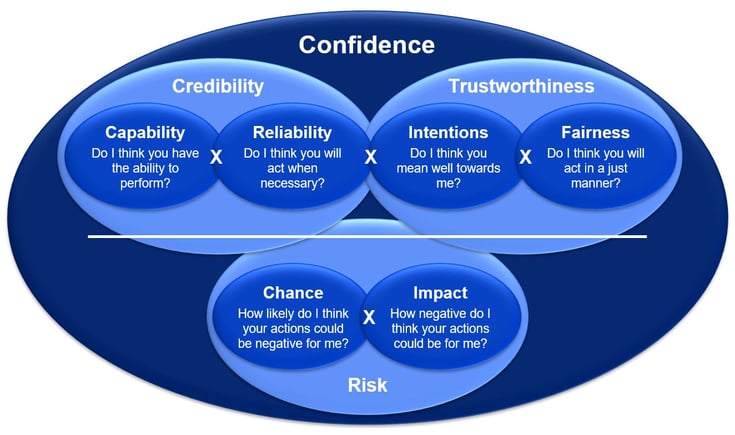What determines how much confidence people have in me?

Confidence is the psychological state of feeling sure about something or someone. When people are confident, they feel certain and at ease, which allows them to move more freely and commit themselves to actions or relationships with less reservations.
People can be self-confident or have confidence in others or the situation. In all cases, confidence is a sentiment based on people’s perceptions. Their confidence will depend on their judgment of something or someone, making it highly subjective and impressionable.
Conceptual model
The Confidence Quotient gives an overview of the key elements determining the level of confidence that people have in someone else. The model indicates that a number of factors (above the division line) reinforce each other in strengthening a person’s confidence in the other – they more than add up (+), they actually multiply each other (x). At the same time, a number of factors below the division line significantly reduce a person’s confidence in the other – together they more than subtract (-) from confidence, they slash it (/). Although pictured as a mathematical formula, the model is intended to indicate the relationship between variables, not to calculate an actual number.
Key elements
In the model there are six key factors that contribute to the level of confidence that someone will have in other people, for example in you:
-
- When it seems convincing that someone has the capacity to deliver, he or she is deemed credible. He or she is highly likely to carry out activities successfully. For you to be viewed as credible, you need to be seen to have these two qualities:
- Capability. Others need to believe that you have the skills and resources required to make it happen. They need to see you as someone who is competent in a particular area and has access to the key people and input required to get things done.
- Reliability. Others also need to feel assured that you will step up at the required moment to actually make things happen. They need to judge you as someone who can be counted on to come through in a predictable and dependable way.
- Trustworthiness. When it seems that someone can be depended on to do the right thing, he or she is deemed trustworthy. He or she is highly likely to behave with integrity and to be mindful of others’ interests. For you to be seen as trustworthy, people will look at two aspects:
- Intentions. Others need to believe that you are truthful about your objectives and that these are not at odds with their own goals. They need to see you as someone without a hidden agenda, as someone whose aims coincide with theirs.
- Fairness. Others also need to feel assured that you will be guided by a sense of reasonableness and fair-mindedness. They need to judge you as someone of a principled morality, who can be counted on to act in a just and balanced way.
- Risk. Besides these aspects that contribute to confidence, people will also consider their exposure to something bad happening. The more they feel vulnerable to possible danger or loss, the less confidence they will have. Your risk profile depends on two factors:
- Chance. Others need to believe that it is unlikely that your behavior will negatively influence them. They need to estimate the odds that your actions will lead to unwanted consequences as relatively low.
- Impact. Others also need to believe that if a negative occurrence does take place, the consequences will not be significant. They need to sense that the possible unfavorable impact of your actions will be relatively low.
- When it seems convincing that someone has the capacity to deliver, he or she is deemed credible. He or she is highly likely to carry out activities successfully. For you to be viewed as credible, you need to be seen to have these two qualities:
Key insights
- Credibility and trustworthiness are different. Trust is often ill-defined. Many people call everything that contributes to confidence trust. But it is useful to distinguish between confidence based on perceived ability (are you credibe to do things right) and perceived integrity (can you be trusted to do the right thing).
- Confidence is based on predicted behavior. People’s current confidence in you depends on how they estimate you will behave in future. That is why they look beyond your capabilities to your future reliability, and beyond your intentions to your future fairness.
- Confidence is based on perceptions. People’s confidence in you is all a matter of subjective evaluation. They will view you through their own biased filter, but also strongly weigh past behavior. So, your track record matters – confidence needs to be built.
- Confidence is undermined by perceived risk. The higher the chance of things going wrong and the bigger the potential impact, the less confident people will be. So, even people who are not risk-averse need to be put at ease, by reducing (the perception of) risk.
- You can influence others’ confidence in you. You can improve yourself, becoming more capable, reliable, well-meaning and fair, while reducing the chance and impact of negative actions. But you also need to actively influence perceptions and your reputation/brand.
This blog is part of a series, if you want to see all the blogs, then click below:




